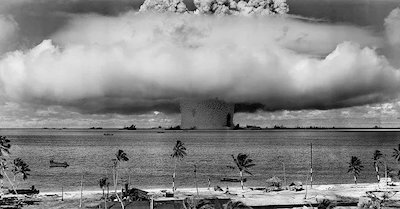The release of atomic energy has changed everything except our way of thinking and thus we are being driven unarmed toward a catastrophe. Albert Einstein
Arguments for the Atomic Bombings
Several arguments were brought forth to support the atomic bombing of Hiroshima, but those proposed for the similar blitzing of Nagasaki (Long Cape, in Japanese) were fewer and inadequate. The two bombs were apparently a packaged deal. The uranium one, codenamed Little Boy, and its sibling, the plutonium one, codenamed Fat Man, were born to be wild. Having comfortably observed the devastation caused by the first boom baby, the new power wished to witness the might of the second kill-all newborn. Hiroshima was surely a grave disgrace and Nagasaki but an absolute abomination. We are supposedly able and willing to learn from our blunders as not to repeat them. Yet a mere three days between the two bombs seemed insufficient a period of enlightenment.
We tend to regard human nature as being extremely complex. However, having emanated from ourselves, this idea may lack objectivity. Actually, human nature is quite simple, resembling that of other animals, but its simplicity is dispensed as complicated, since it can often trigger devastating consequences. The implications of I think therefore I am and all its approximations may constitute the source of our downfall (I prefer: I think therefore I think I am). The nature in human nature is unpredictable and possesses many connotations in which Nagasaki holds a prominent position. Liberals are still a novel offshoot of our species, and before their timely conception, compassion and rectitude were mostly elements of an ultimate reality. Their continuous existence is never assured because the nature of our human nature is, as history demonstrates, forever volatile.
It is fairly ironic that the bombs dropped on Hiroshima and Nagasaki were followed by the development of the Hydrogen and Neutron bombs. Human Nature had struck again. Hugo and Nietzsche were right. It is surely purely accidental that the initials of these word couples correspond perfectly, but the underlying message is more important than the messenger. But what is the message, after all? Why was Nagasaki practically obliterated only three days after the destruction of Hiroshima?
Four Points of View
Moody (1995) relates the unfortunate version. Apparently, Nagasaki was not the primary target. The pilot of Bocks Car, the B-29, was facing fire in Kokura, the original destination of the bomb, and consequently drove Fat Man to the secondary one: Nagasaki. In other words, Kokura was lucky that dreadful day and Nagasaki was not. The bomb would still have been dropped, the question would still have been asked, and civilians would still have been killed, but Kokura would have suffered the wrath of Fat Man instead: the only difference.
Alperovitz (1965) delivers the political interpretation. The American public was quite excited the day following the bombing of Hiroshima. The war, according to the newspapers, would be over more quickly than it was originally anticipated. It would be a matter of weeks if not days before the end of the Pacific engagement. The news of the bombing of Nagasaki surely “convinced those who might have doubted the extent of the new power” (Alperovitz 189). Furthermore, a day before Nagasaki’s dehumanisation, the Soviet Union declared war on Japan. Fearing that the Reds may lay claim on part of the Japanese homeland, the Americans wanted to ensure a Japanese surrender as soon as possible. A second atomic bomb seemed to be the best way to achieve that objective. Japan did capitulate following Nagasaki and the Americans took all the cake. Had the Russians delayed their war declaration on Japan, Nagasaki might have been spared. After all, the Japanese had sent a message of acceptance to the Americans regarding their surrender following Hiroshima, but apparently, they were not convincingly clear.
Knebel and Bailey (1960) recount the humane explanation. Hiroshima was the first step to victory and Nagasaki was supposed to guarantee it. “Major Charles Sweeney, who carried instruments over Hiroshima and dropped the bomb on Nagasaki, saw the killing of 115,000 civilians as balanced by the saving of many more lives, both American and Japanese, that would otherwise have been lost in an invasion of Japan” (Knebel and Bailey 247). Sweeney could not seemingly differentiate between the ruination of Tokyo by napalm and the shattering of Nagasaki by plutonium. Yet he gave lectures, recounting the atomic bombings while sending all the profits to an orphanage in Hiroshima. It seems that there were no orphans left in Nagasaki.
Jungk (1958) offers the rat elucidation. Most of us fear rats and especially the various diseases that they may carry. Nevertheless, we are the real rats. We spread massive destruction wherever we are, we drop the bombs, we pull the trigger, we slaughter, and we count the dead. We like statistics. One of the creators of the plutonium bomb, refusing to be named, readily admitted: “I dreaded the use of this ‘better’ bomb. I hoped that it would not be used and trembled at the thought of the devastation it would cause. And yet, to be quite frank, I was desperately anxious to find out whether this type of bomb would also do what was expected of it, in short, whether its intricate mechanism would work. These were dreadful thoughts, I know, and still I could not help having them” (Jungk 223).
Closing Remarks
A hypothesis can never be sufficient, requiring experimentation and practice. A number of these scientists, unfortunately not an aberration, wanted to be sure of the power of their creation. Is it better to die as an unknown or as a famous murderer? Obviously, there are those who prefer the latter.
Homo sapiens seem to be the most creative species on this planet, but they are also the most destructive. Whether unlucky Nagasaki was eradicated for political, humane or despicable reasons does not diminish the result. World War II contained the apogee of human cruelty and Nagasaki was only a bright instance of its barbarity.
Numerous books and myriad articles have been written about the two atomic bombs that were dropped on Japan. With key words like atomic bomb, Hiroshima, Nagasaki and nuclear bomb, we uncover ample literature on the subject. Yet how do we find an answer to a specific question about a more general topic, and in this case, relating to Nagasaki? Professedly, the question regarding the reason(s) for Nagasaki, the unfortunate city, is rarely raised. It seems that the obvious reasons are sufficient. Three quarters of a century have passed, and at present, we commemorate the event but neglect to inquire about the rationale behind it. Remembering Hiroshima and Nagasaki may help us to avoid repeating their effects. Nevertheless, when the “why” is absent, the “why not” may validate human nature all over again.
References
Alperovitz, G. Atomic Diplomacy: Hiroshima and Potsdam. New York: Simon and Schuster, 1965.
Jungk, R. Brighter than a Thousand Suns: A Personal History of the Atomic Scientists. New York: Harcourt Brace Jovanovich, 1958.
Knebel, F., and Bailey, C. W. No High Ground. New York: Harper & Brothers, 1960.
Moody, S. 1995. “About the Enola Gay: Cyanide pills and rice paper”. Vancouver Sun, August 4: B1, B4.




